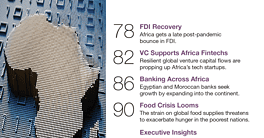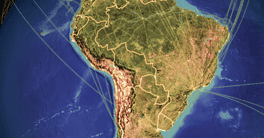Africa has been waiting for the US to launch a new wave of investment. But is Washington willing to help?

It has never been a tradition of Africa to disregard the US Yet, the lukewarm reception that greeted then- national security advisor John Bolton when he unveiled President Trump’s new policy on Africa last December speaks to a continent that has evolved into a new era.
Africa, over the past two decades, has become emboldened. As the final frontier in anchoring global economic growth and integration and with new allies like China, the continent’s leaders no longer feel obligated to take their lead only from Washington. The days when Africa was defined completely by humanitarian aid, insecurity and lawlessness and US pet projects, are gone. “Today, Africa wants commercial engagements,” says Patricia Rodrigues, analyst at UK-based consultant Control Risks.
The US is waking up to this new reality. With a new initiative dubbed Prosper Africa, Washington is focusing on advancing trade and commercial ties with the continent ahead of security and aid. Taming China’s and Russia’s “predatory practices” is also a core aim, Bolton said in December, including turning Africa away from its growing economic ties to China.
Until now, US commercial ties with Africa have been fragmented, enjoying little support from Washington. The African Growth and Opportunity Act (AGOA), hailed as a major step forward on its passage in 2000, has been largely a flop. Since then, two-way trade has risen only from $20 billion to $39 billion in 2017. Oil and oil products dominate. with non-oil imports accounting for a paltry $5 billion today.
While resources are still the biggest game in town for US investors, activity is picking up and even beginning to diversify. Coca-Cola has committed to invest $1.3 billion in infrastructure, brands and marketing over the next five years in a bid to build a stronger business in Africa. Texas-based Anadarko Petroleum Corporation intends to invest $20 billion in a gas liquefaction and export terminal in Mozambique, the biggest such project ever approved in Africa. General Electric is leading the Albertine Graben Refinery Consortium that won the contract to build a $4 billion crude refinery in Uganda. And Bechtel Corporation is building a $3 billion expressway in Kenya.
Renewed American interest makes the continent once again a battlefield for geopolitical interests, however. Apart from China and Russia, the UK will be looking to deepen engagements with Africa after Brexit. Japan is also seeking to protect its interests while France, Germany and India, among others, are hoping to cement their presence on the continent.
Waiting to Welcome Washington
“The US has lost significant ground to geopolitical competitors in the region,” according to a report by the Center for Strategic and International Studies, “Economic Engagements in Africa.”
For African countries, the prospect of US reentry means a flood of opportunities that could yield faster economic growth and creation of valuable jobs to absorb a ballooning youthful population. With the youngest population in the world, Africa is grappling with unemployment at 50%: a serious source of unrest.
To address the challenge, attracting more foreign direct investment is crucial. FDI flows to Africa rose 11% to $46 billion in 2018, according to UNCTAD’s World Investment Report 2019. The US remains a major investor with FDI stock worth $50 billion in 2017, third only to France and the Netherlands and ahead of China, whose stock stood at $43 billion.
Notably, while the US FDI is down from $61 billion in 2013, China’s has grown rapidly. While US accuses China of “neocolonialism” in Africa, “the most beneficial US Africa strategy should not be countering China’s success,” says Dan Steinbock, founder of consultant Difference Group. “It should be to support US companies’ efforts to excel in the region.”
Africa boasts six of the 10 fastest growing economies in the world, an expanding middle class, a growing consumer base driven by rising per capita income, increasing urbanization and improving infrastructure.
Yet, Africa remains largely unexploited. The African Development Bank estimates the continent’s infrastructure needs amount to $130 billion to $170 billion a year, with a financing gap in the range of $68 billion to $108 billion. Huge mineral deposits remain underground while trade, both intra and extra, remains insignificant. Intra-African exports, for instance, amount to less than 20% of total exports whereas in Europe and Asia they stand at 69% and 59%, respectively.
There is still plenty to makes US companies cautious. Political instability and interference, corruption, an unpredictable regulatory environment and weak systems of government add up to a minefield in which American operators, unlike their Chinese counterparts, must keep their activities above reproach.
Lack of a coordinated support strategy from Washington worsens the situation. “US companies have not benefited from diplomatic support,” says Rodrigues.
Prosper Africa suggests that the US government will be more proactive in supporting US companies’ efforts to identify and maximize business opportunities, says Phillipine Mtikitiki, president of the American Chamber of Commerce in Kenya (see interview, this issue). The groundwork was laid with passage of the Better Utilization of Investments Leading to Development Act late last year. The new law created the International Development Finance Corporation (IDFC), with an annual budget of $60 billion: an amount that matches what China has pledged for assistance, investment and loans in Africa.
IDFC will make equity investments in African companies and offer risk mitigation to US companies investing in large-scale projects. That could place these companies in a better position to compete with Chinese businesses that already enjoy state backing and state-sanctioned financing. Mtikitiki, who is also Coca-Cola’s general manager for East and Central Africa, contends this will encourage companies take up the “opportunity to not just invest but focus their future growth to Africa.”
A Single African Market
While renewed US interest in Africa is coming late in the day, it arrives at an opportune moment. Implementation of the African Continental Free Trade Area (AfCFTA), which includes most of the continent and all of its largest economies means that the continent is finally starting to transform itself into a single market.
The elimination of tariffs under the agreement will aid market-seeking foreign direct investors that want to tap into a market of 1.2 billion people with a combined GDP exceeding $2.2 trillion. By creating a borderless market that facilitates movement of people and goods, AfCFTA dismantles a major obstacle to trade and investment as well as making a statement of commitment to value addition, particularly for commodities and natural resources.
However, the success of US commercial engagement in Africa will depend, to a large extent, on the effective implementation of Prosper Africa—and this is by no means certain. The initiative has taken a back seat as the Trump administration tackles bigger and more immediate geopolitical matters like its tariff war with China and security threats from Iran and North Korea. Prosper Africa is bound to receive even less attention as the US enters an election year.
The CSIS report emphasizes that clarity in process is paramount to making the initiative successful and enduring, including its goals on trade and investment. It also needs
strong thematic focus, embracing entrepreneurship, expanding infrastructure and telecommunications investments and fostering two-way trade by negotiating regional trade agreements. If none of this happens, Prosper Africa risks turning into a statement of good intentions with no teeth.



